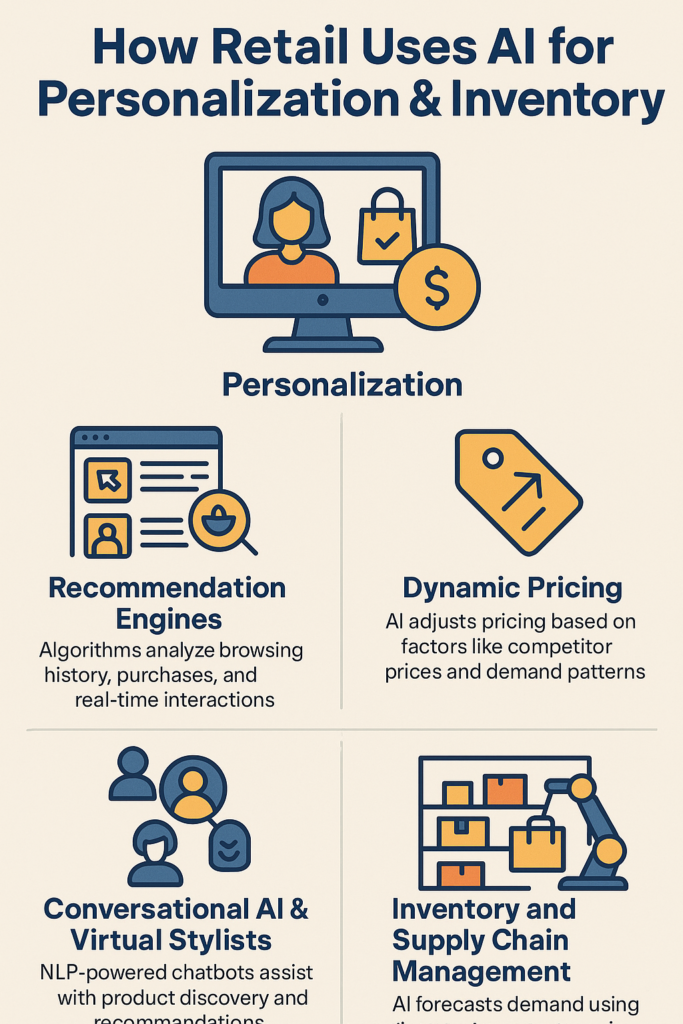Discover how AI is reshaping retail—personalized recommendations, smart inventory forecasting, dynamic pricing, and efficient supply chains. Learn how leading brands use AI to stay ahead.
How Retail Uses AI for Personalization & Inventory
Smarter Shopping and Supply Chains with Artificial Intelligence
In 2025, artificial intelligence (AI) has become the backbone of modern retail. From crafting personalized shopping experiences to dynamically managing inventory and logistics, AI technologies are enabling retailers to boost customer satisfaction, reduce waste, and maximize profit margins.

🛍️ Personalization: The AI-Powered Shopping Experience
Retailers are leveraging AI to understand customer preferences, predict behavior, and deliver personalized experiences across channels.
🎯 Recommendation Engines
Machine learning models analyze:
- Browsing history
- Purchase patterns
- Real-time interactions
- Social media signals
Algorithms like collaborative filtering, deep neural networks, and transformers (e.g., BERT-based models for product search) drive the engine behind “You might also like” suggestions.
🧠 Customer Segmentation
Clustering algorithms (e.g., K-means, DBSCAN) group customers based on:
- Lifetime value (LTV)
- Churn risk
- Price sensitivity
These segments enable targeted marketing and promotions with higher ROI.
🗣️ Conversational AI & Virtual Stylists
Retail chatbots powered by NLP can:
- Assist with product discovery
- Handle returns
- Offer style or size recommendations
Advanced models adapt responses based on past interactions and user sentiment.
🛒 Dynamic Pricing
AI models predict optimal prices in real-time by analyzing:
- Competitor pricing
- Inventory levels
- Seasonal trends
- Customer demand elasticity
📦 AI in Inventory and Supply Chain Management
AI enables retailers to match supply with demand more accurately than traditional ERP systems, reducing overstocking, understocking, and logistics costs.
📈 Demand Forecasting
Retailers use time-series models, recurrent neural networks (RNNs), and even transformer-based models (like Temporal Fusion Transformers) to forecast demand at a hyperlocal level.
Factors considered:
- Weather and events
- Search engine trends
- Social media mentions
- Point-of-sale data
🔁 Automated Replenishment
Predictive models trigger restocking at the right time. Combined with IoT sensors, systems can monitor stock levels in real time and reorder based on projected sales.
🚚 AI in Logistics Optimization
AI optimizes routes, warehouse picking, and delivery times using:
- Reinforcement learning
- Genetic algorithms
- Real-time traffic and supply chain signals
This reduces delivery costs and shortens fulfillment windows—critical in the era of same-day shipping.
🧾 Case Study: Fashion Retail Personalization
A global apparel brand uses AI to:
- Analyze customer returns for size mismatches
- Recommend better fits using NLP sentiment from reviews
- Personalize homepage content with visual search and style-matching algorithms
Results: - 20% increase in average order value (AOV)
- 35% reduction in return rate
- +40% engagement with personalized recommendations
🔐 Ethical & Operational Challenges
1. Data Privacy & Consent
With AI depending on customer data, retailers must comply with GDPR, CCPA, and emerging privacy laws. Federated learning and differential privacy are becoming popular solutions.
2. Bias & Fairness
AI systems must be audited to avoid discriminating against specific user groups—especially in pricing or promotions.
3. Scalability
AI systems need to operate across thousands of SKUs and store locations. Cloud-native solutions and edge computing are key to real-time, scalable deployment.
🛍️ The Future of AI in Retail
By 2030, expect to see:
- Hyper-personalized storefronts unique to each shopper
- AI-generated fashion and product designs
- Autonomous retail stores that manage themselves using AI, sensors, and robotics
- Emotionally intelligent AI that adjusts recommendations based on customer mood or tone of voice
Final Thoughts
AI is transforming the retail industry from reactive to predictive. Retailers that harness AI for both customer personalization and intelligent inventory control will lead the market in both efficiency and experience. As data and algorithms mature, the synergy between physical and digital retail will only grow stronger.